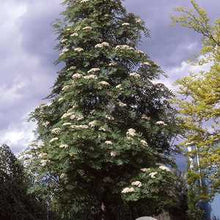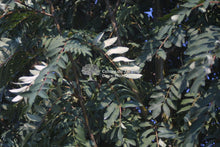Sorbus aucuparia 'Skybound'
Height: 30 feet
Spread: 20 feet
Sunlight: Sun
Hardiness Zone: 3a
Description:
A beautiful and popular small accent tree featuring clusters of white flowers in spring followed by orange-red berries lasting into winter; shiny gray bark, attractive compound leaves turn orange and red in fall; needs well drained soil
Ornamental Features
Mountain Ash features showy clusters of white flowers held atop the branches in mid spring. The orange fruits are held in abundance in spectacular clusters from early fall to late winter. It has dark green foliage throughout the season. The oval compound leaves turn an outstanding orange in the fall. The smooth olive green bark adds an interesting dimension to the landscape.
Landscape Attributes
Mountain Ash is a deciduous tree with a shapely oval form. Its relatively fine texture sets it apart from other landscape plants with less refined foliage.
This is a relatively low maintenance tree, and is best pruned in late winter once the threat of extreme cold has passed. It is a good choice for attracting birds to your yard. Gardeners should be aware of the following characteristic(s) that may warrant special consideration;
- Disease
Mountain Ash is recommended for the following landscape applications;
- Accent
- Shade
Planting & Growing
Mountain Ash will grow to be about 30 feet tall at maturity, with a spread of 20 feet. It has a low canopy with a typical clearance of 4 feet from the ground, and should not be planted underneath power lines. It grows at a medium rate, and under ideal conditions can be expected to live for 50 years or more.
This tree should only be grown in full sunlight. It is very adaptable to both dry and moist locations, and should do just fine under average home landscape conditions. It is not particular as to soil type or pH. It is highly tolerant of urban pollution and will even thrive in inner city environments. This species is not originally from North America.



